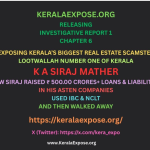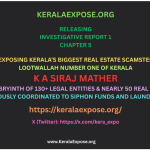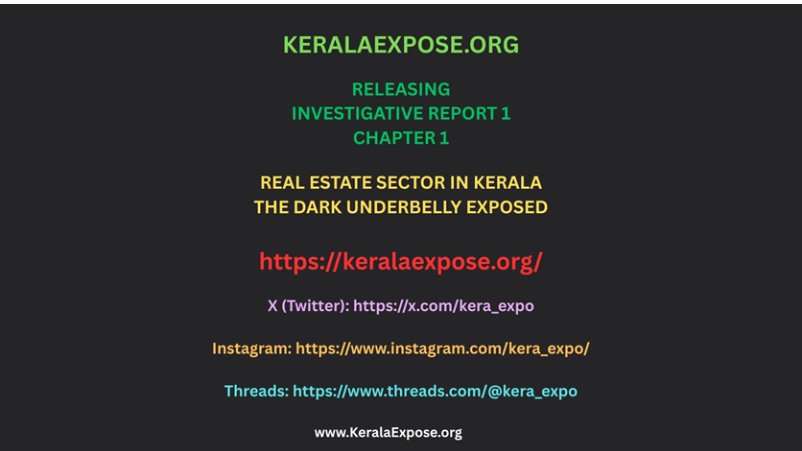
KeralaExpose.org - Investigative Report 1 - Chapter 1 - Real Estate Sector in Kerala - The Dark Underbelly Exposed
Kerala, often lauded for its robust social indices and progressive governance, hides a growing malignancy within its lucrative real estate sector. Behind the veneer of glassy high-rises and serene waterfront villas, a catastrophic failure of regulation, political patronage, bureaucratic nexus and police complicity has facilitated calculated fraud by unscrupulous real estate developers and builders hidden and suppressed from the mainstream media which has devastated thousands of middle-class investors robbing them of their hard earned life savings.
By Admin / Oct 20, 2025
Today, on 20 October 2025, Monday, we, KeralaExpose.org, are releasing our Investigative Report 1.
KeralaExpose.org’s first expose (story) - Investigative Report 1 - is about the "Real Estate Sector in Kerala - The Dark Underbelly Exposed”.
Kerala, often lauded for its robust social indices and progressive governance, hides a growing malignancy within its lucrative real estate sector. Behind the veneer of glassy high-rises and serene waterfront villas, a catastrophic failure of regulation, political patronage, bureaucratic nexus and police complicity has facilitated calculated fraud by unscrupulous real estate developers and builders hidden and suppressed from the mainstream media which has devastated thousands of middle-class investors robbing them of their hard earned life savings. This investigative report by KeralaExpose.org will rip away the façade of glittering marketing, glossy brochures and celebrity endorsements to expose the mechanisms that allow unscrupulous real estate developers, builders and their powerful enablers to operate with impunity in Kerala, leaving in their wake a trail of ruined finances, broken families, and court dockets choked with litigation.
For too long, the explosive growth of Kerala's real estate sector has been viewed through a prism of booming development and seamless investment. KeralaExpose.org, however, peels back this glossy, billions of rupees exchanging, facade to reveal a deeply entrenched and devastating network of wrongdoings, criminal acts, fraudulent acts, nepotism, corruption and scams with political blessings, bureaucratic nexus, police complicity, and environmental plunder that has flourished beneath the surface.
In this Investigative Report 1, "Real Estate Sector in Kerala - The Dark Underbelly Exposed", we commence our comprehensive deep dive, presenting irrefutable evidence that dives deep into the nexus of illegal land conversions, mass-scale unauthorized constructions, and the systemic exploitation of marginalized communities, marking the beginning of our commitment to hold the fraudulent and unscrupulous real estate developers, one by one, accountable for transforming the state's vibrant real estate landscape into a compromised and fraudulent one cheating thousands of investors of their life-long heard earned savings and with deep connect to both anti-social elements and anti-national forces.
In a series of chapters which will be released in the coming days and weeks, we will expose the hidden and suppressed real estate operations of a slick and silent operator which has cost Kerala Society thousands of crores of rupees and has resulted in unending pain and tears for 2000+ families and possibly has put the state and nation at risk with his hidden activities linked to both anti-social elements and anti-national forces.
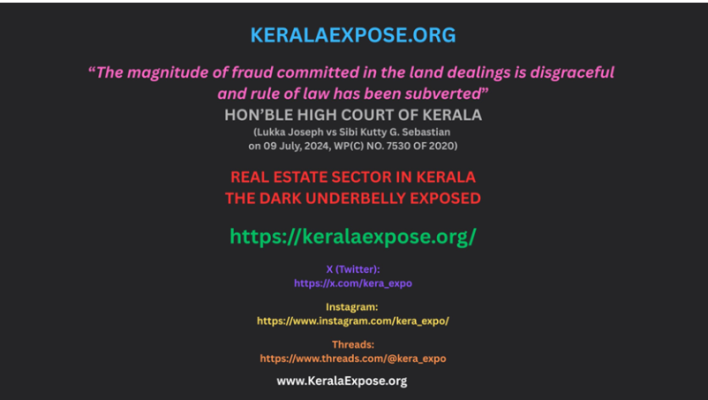
In a judgement in 2024, High Court of Kerala stated, “The magnitude of fraud committed in the land dealings is disgraceful and rule of law has been subverted.”
(High Court of Kerala in Lukka Joseph vs Sibi Kutty G. Sebastian on 09 July 2024, WP(C) NO. 7530 OF 2020).
While this case was related to extensive land fraud in Idukki district, the Kerala High Court, in this significant ruling, directed a Special Investigation Team (SIT) to investigate the fraudulent transactions into the extensive land fraud in Idukki district and initiate appropriate legal actions against all individuals, including officials and retired officials, implicated in the manipulations.
In this judgement, then Acting Chief Justice A. Justice Mushtaq Muhammad and Justice S. Manu, observed that “The magnitude of fraud committed in the land dealings is disgraceful and rule of law has been subverted. It is a matter of shame for the state that the system failed for long to act against the organized grabbing of land vested with the Government. Hundreds of beneficiaries of land grabbing have amassed wealth at the cost of public and escaped from the clutches of law due to collusion, lethargy etc. on the part of the concerned.” The Court further stated “Being the highest constitutional court of the state, we owe a duty to ensure stringent actions in accordance with law, when such fraudulent transactions come to our notice in cases considered by us,” and further directed “Special Investigation Team to conduct proper investigation into the transactions involved in this writ petition.”
This shows how even the High Court of Kerala has taken cognizance of the interplay amongst the politicians in power, bureaucrats who do the paperwork and the unscrupulous real estate players to cheat innocent investors in bonafide land dealings and investments in real estate (villas, apartments, commercial space etc.) they undertake believing in the system.
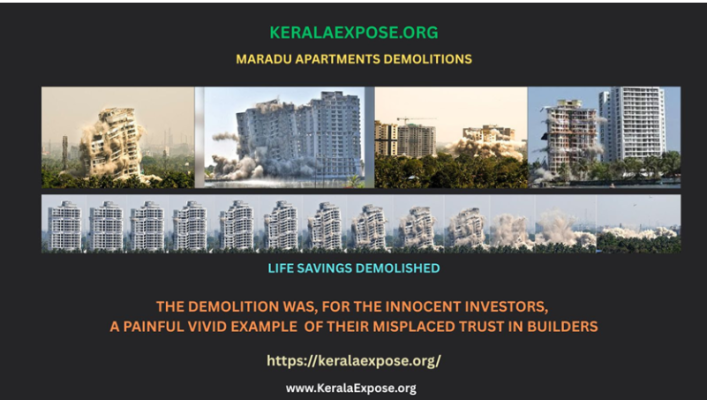
The most visible and terrifying example of regulatory lawlessness culminating in catastrophic financial loss to about 300+ innocent families in Kerala is the fate of the four luxury apartment complexes in Kochi's Maradu municipality - H20 Holy Faith: A 19-story building with 91 apartments developed by Holy Faith Builders and Developers Pvt Ltd; Alfa Serene: A complex with twin towers with 80 apartments developed by Alfa Ventures Private Ltd; Jain Coral Cove: A 17-story building with 128 flats and was the largest of the four developed by Jain Housing and Construction Ltd; Golden Kayaloram: A 17-story building with 40 apartments developed by KP Varkey & VS Builders.
For three hundred+ families, their life savings evaporated into dust after the Supreme Court, in its landmark 2019 judgment, mandated the demolition of these waterfront high-rises for egregious Coastal Regulation Zone (CRZ) violations. The apex court’s stern stance - that illegal construction in coastal areas is a “colossal loss to the environment" and must be removed - delivered a brutal reality check to innocent investors who trusted the seemingly legitimate developers and approval of the local authorities. While the State eventually provided interim compensation to the victims, the ruling underscored a painful truth for Kerala investors - when the environmental regulatory mechanism fails, the law sides unequivocally with the preservation of nature, leaving the 'bona fide' homebuyer facing the ultimate forfeiture of both invested money and home.
The financial toll on the investors is directly linked to a systemic disregard for environmental and planning laws. This reality was violently exposed by the demolition of these four apartment complexes in Kochi's Maradu municipality for severe violations of the Coastal Regulation Zone (CRZ) regulations. For the owners, this represented the highest form of judicial penalty. As the Supreme Court stated in one related order, illegal construction in coastal areas is a “colossal loss to the environment.” While the builders were the ultimate transgressors, the owners were the immediate victims, losing their property and home despite having relied on seemingly valid permits issued by municipal authorities.
For the hundreds of families forced out of the Maradu apartments, the months leading up to the controlled implosion (demolition) were a protracted public spectacle of grief and trauma. Their personal catastrophe became a televised national event, turning private homes into symbols of state authority. Residents, who had invested their entire life savings and years of memory into these "dream homes," often described a feeling of helplessness and betrayal. One former resident, a musician, lamented that the apartment - which included a soundproof acoustic room and housed six years of family life - was not just concrete, but shattered dreams. Other flat owners reported acute stress, anxiety, and sleep deprivation, haunted by the recurring image of their homes being reduced to rubble. Psychiatrists noted that the demographic most affected were senior citizens, for whom the sudden, violent loss of their life’s single largest asset and identity caused a catastrophic rupture, leaving them to face retirement in rented uncertainty. The demolition was, for the owners, a painful, vivid execution of their misplaced trust in real estate developers who promised them a paradise in God's Own Country backed by glittering advertisements, fancy brochures, and endorsement by their favourite celebrities.
The catastrophic failure of regulation is not an accident of oversight. it is a calculated feature of a toxic nexus where political power, bureaucratic support and builder interests intersect. The life cycle of an illegal construction often begins not with a shovel, but with a handshake between a powerful developer and a compliant official or politician. In Kerala, this collusion manifests most brazenly through repeated government interventions to retroactively pardon violations. The frequent introduction of 'Regularisation of Unauthorised Construction' rules - such as those debated for Panchayats and Municipalities - serves as an institutionalized amnesty scheme, enabling builders to violate building and zoning norms with impunity, knowing that a political fix, typically requiring the payment of a fine rather than demolition, is only an ordinance or even a government order (GO) away. This revolving door of transgression and pardon fundamentally undermines the rule of law and incentivizes illegality especially by the unscrupulous real estate developer and builder.
The core enabler of this systemic chaos is the cozy nexus between builders and the political-bureaucratic establishment, a relationship built on circumventing stringent land, building and environmental laws designed to protect Kerala's fragile ecosystem. This connivance often manifests in high-profile land conversion scams, where ecologically protected areas or lands assigned solely for agricultural use and even wetlands and paddy fields are illegally converted for commercial projects through the expedient grease of bureaucratic corruption. Furthermore, the political will to punish is frequently replaced by a desire to legitimize illegality; the state has repeatedly introduced large-scale mass regularization drives to grant amnesty to illegal constructions up to a certain date, effectively rewarding those who flouted the rules while simultaneously undermining the authority of local self-government institutions and disincentivising the real estate developer and builder who follows the laws, rules and regulations both in letter and spirit. The continuous pattern of creating rules to regularize violations - rather than strictly enforcing existing laws - is the clearest evidence that, at the highest levels of power, the interests of the powerful builder lobby supersede those of the environment, planning and the common citizen.
This nexus is most pronounced in high-value land matters, where political backing and bureaucratic nexus facilitates the bypassing of critical planning and environmental laws, often involving agricultural (wetland and paddy fields) or forest land conversion. For instance, in the fragile ecosystem of Munnar, illegal commercial structures - including those linked to powerful political parties - have repeatedly been the subject of government bills to amend the Land Assignment Act and Land Use Rules to regularize misuse, effectively rewarding those who defied environmental protection and planning measures.
Similarly, major land fraud cases, such as the high-profile Jawahar Nagar land scam in Thiruvananthapuram, continue to reveal how the administrative process - from revenue records to registration - is subverted through the alleged connivance of local political leaders, compliant bureaucrats, and influential land brokers. These examples demonstrate that the "dark underbelly" in the real estate sector in Kerala thrives not just on greed, but on the systematic weaponization of state machinery against public and environmental interest.
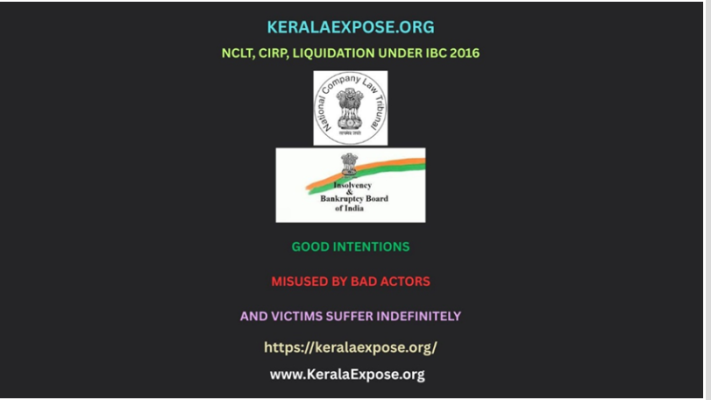
Beyond the headline-grabbing demolitions, a more insidious form of investment destruction is unfolding within the National Company Law Tribunal (NCLT) in Kochi, where a growing list of real estate developers faces insolvency proceedings under the Insolvency and Bankruptcy Code (IBC). Today, the crisis in the real estate sector in Kerala created by the unscrupulous builders continues to unfold across the state, with the National Company Law Tribunal (NCLT) in Kochi routinely admitting insolvency and liquidation proceedings against even major real estate developers. These cases transform a contractual dispute into a cold, complex legal battle where homebuyers - now categorized as financial creditors - are forced to jostle for meagre relief, often recovering only a fraction of their life savings if at all anything can be recovered.
Buyers who invested in delayed or stalled projects are forced to band together, filing petitions against defaulting real estate developers (corporate debtors) in a desperate attempt to salvage their dues. While the IBC provides a path for homebuyers - recognized as 'Financial Creditors' - the recovery process is glacial and often yields pennies on the rupee. Complicating matters further, judicial scrutiny has tightened, with the Supreme Court observing that the IBC is "not a recovery mechanism or a bargaining chip," particularly for those deemed "speculative investors," effectively limiting the legal recourse available to those who merely sought profit in the overheated market.

Thousands of investors have lost money in the real estate sector in Kerala having put their had earned money into purchasing villas, apartments and land plots believing in the glittering promises made by various builders often using celebrities as brand ambassadors - Mammotty... Asif Ali... Yesudas… the list is long and growing...
https://www.business-standard.com/article/economy-policy/mammootty-is-brand-ambassador-for-pearls-infra-110082800022_1.html
https://www.youtube.com/watch?v=-mJ0uSALHYU
https://www.emirates247.com/property/real-estate/yesudas-tunes-out-of-property-firm-2012-01-29-1.439941
The primary mechanism used to lure thousands of families, often non-resident Keralites (NRKs) or middle-class investors, by the real estate developers and builders to invest in a real estate project begins with glittering marketing, colourful brochures promising paradise in God's Own Country and using celebrities to deliberately manufacture trust. Real estate developers who operate with impunity have routinely employed the biggest faces in Malayalam cinema and music - including icons like Mammootty, Yesudas, and Asif Ali - as their brand ambassadors. These glittering endorsements serve as a psychological inducement, transforming risky, under-regulated investments into seemingly secure assets backed by the credibility of Kerala’s most respected celebrities. This strategy has proven devastatingly effective, allowing unscrupulous builders to collect massive sums of hard-earned money, often their life savings, for projects that were either non-compliant, located on illegally converted land, or simply never completed. And then the real estate developer disappears leaving not even a contact for the innocent investor to follow up for return of their money or delivery of the promised land, apartment, villa, or commercial space.
Most interestingly, while central agencies like the Enforcement Directorate (ED) and Police in various states vigorously pursue, question and attach assets of celebrities, including Bollywood stars and cricketers, treating the brand endorsement fees for endorsing illegal betting apps as proceeds of crime under the Prevention of Money Laundering Act (PMLA), the Mollywood superstars and elite associated with failed real estate developers and projects often disassociate themselves from the failed real estate developer or project with casual impunity at the first sign of failure of the real estate developer or the real estate project which was endorsed by them after collecting huge brand or project endorsement fees. The celebrity who received massive amount of money as endorsement fees walks away with no consequences with no law to hold celebrity endorsers to account when their endorsement leads to the ruin of thousands of trusting investors in the Kerala real estate market.
Reliable sources have informed KeralaExpose.org how some Mollywood stars and individuals connected with the Mollywood industry often lend their name to illegal and illegitimate real estate projects without formally endorsing the project by visiting the site, or even tacitly acknowledging rumours that they have purchased property in that particular project. These stars then collect their fees in hawala in Dubai which is easy for the builder to manage as a large percentage of their customers are non-resident Malayalees living and earning in the Gulf. The slick and silent real estate developer who we will be exposing in the forthcoming chapters was a kingpin in using the names of celebrities in this manner and paying them through hawala in Dubai.
https://www.newindianexpress.com/business/2025/Jun/18/ed-questions-cricketers-film-stars-for-ads-promoting-illegal-online-betting-apps
https://www.business-standard.com/india-news/online-betting-case-ed-to-attach-assets-of-some-cricketers-actors-125092800385_1.html
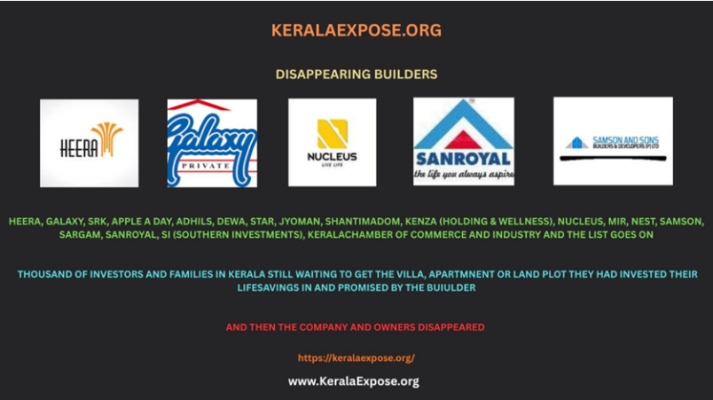
Builders who have cheated their customers and have mostly disappeared include Heera, Galaxy, SRK, Apple A Day, Adhils, Dewa, Star Homes, Jyoman, Shantimadom, Kenza, Nucleus, MIR, NEST, Samson, Sargam, Sanroyal, Si (Southern Investments), Kerala Chamber of Commerce & Industry and the list goes on… with thousands of investors and families in Kerala still waiting to get the villa, apartment or land plot they had invested in and promised by the builder. (A simple Google Search of the internet will highlight all the above names. Hence, we are not listing the links here individually to the case judgements, media reports, police complaints etc. about the above companies). Thousands of innocent investors who invested their hard-earned life savings with these builders and many others demonstrate that the core promise of the Kerala real estate sector is, for thousands of families, a calculated, broken contract built on fraud, deception, and cheating.
The scale of the betrayal in the real estate sector in Kerala is staggering, transitioning from mere project delay to systemic fraud. The collapse of the Heera Group stands as a chilling case study - while primarily a financial scheme, its real estate arm left investors in Kerala holding onto worthless agreements, leading to intervention by agencies like the Serious Fraud Investigation Office (SFIO) and the Enforcement Directorate (ED) with effectively no hope for the investor of ever getting the invested money back from the builder or the villa, apartment or commercial space they paid for (the corporate insolvency resolution process may offer them a pathway to get something out of nothing but not from the builder but a new resolution applicant).
Similarly, the insolvency proceedings against various builders at the National Company Law Tribunal (NCLT), Kochi, starkly illustrate the seriousness of the crisis. Thousands of individual homebuyers (families) were left in limbo after various builders failed to deliver, forcing them into complex legal battles against such builders under the corporate insolvency resolution process under the Insolvency and Bankruptcy Code, 2016.
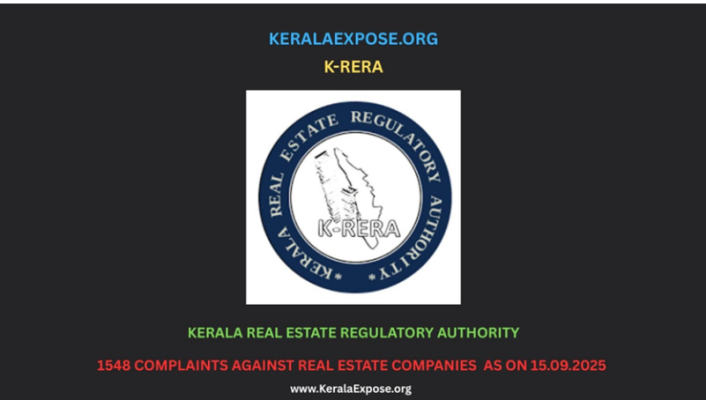
Kerala RERA (K-RERA) website lists 1548 complaints against Real Estate Companies, Builders and Developers in Kerala as on 15.09.2025 (https://krera-audit.xocortx.com/complaint-list). Consumer Disputes Redressal Commission complaints against Real Estate Developers in the District, State and National levels are separate from the RERA complaints as also civil cases and criminal cases against Real Estate Companies, Builders and Developers in Kerala.
The quantifiable evidence of this rot in the real estate sector in Kerala is etched into the records of the legal system. As of the third quarter of 2025, the Kerala Real Estate Regulatory Authority (K-RERA) itself reports over 1,500 active complaints against fraudulent or defaulting real estate developers. Yet, this figure captures only a single dimension of the legal catastrophe. The total universe of investor grievances is far wider, encompassing thousands of parallel cases lodged with the District, State, and National Consumer Disputes Redressal Commissions (CDRCs), in addition to mounting civil suits for breach of contract and criminal First Information Reports (FIRs) filed under sections pertaining to cheating and criminal breach of trust. This multi-forum legal assault on builders underscores an undeniable reality - the system is failing both in prevention of cheating, deception and fraud and timely recourse for the innocent investors.
The sad state of affairs in the real estate sector in Kerala is thus summarized by the vast, unaddressed backlog of cases, symbolizing not just financial loss but the collapse of faith in the governance and regulatory infrastructure.
In Chapter 1, we have presented a macro picture of the bad actors and bad actions in the real estate sector in Kerala and detailed the mechanisms - from the political manipulation of land laws, the bureaucrat nexus which makes many of these frauds happen, the exploitation of celebrity trust to collect money from the investors, the inaction of the law enforcement agencies and the silence of the mainstream media - that allow this dark underbelly to thrive in the real estate sector in Kerala. Effectively, the victims in the real estate sector in Kerala are left with nothing but court dates, mounting legal fees, and the crushing knowledge that their life savings vanished into non-existent properties.
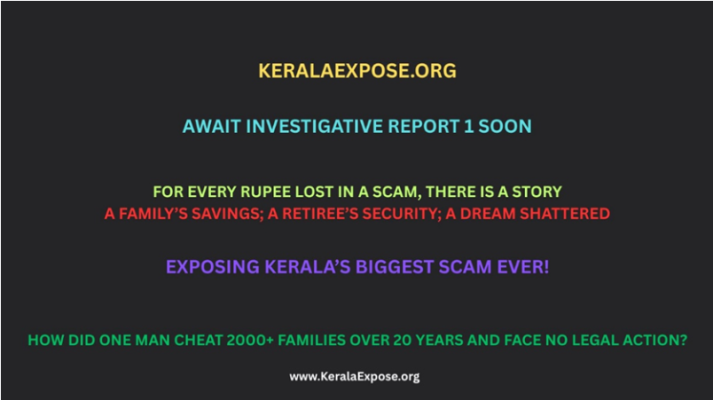
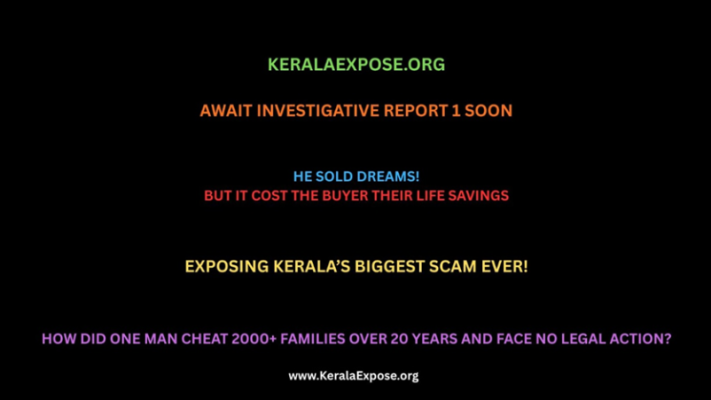
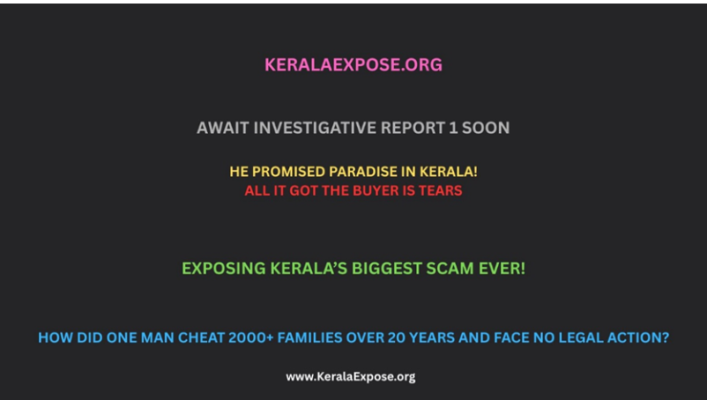
Unlike mainstream media, we will be focussing in this expose on one real estate fraudster who has cheated 2000+ innocent families of thousands of crores of rupees of their hard-earned life savings over the last 20+ years subverting laws in India and UAE and is still continuing his extravagant lifestyle with no legal action against him successfully managing the politicians, bureaucrats, police, media and even the victims.
Wait for the next chapters of Investigative Report 1.

